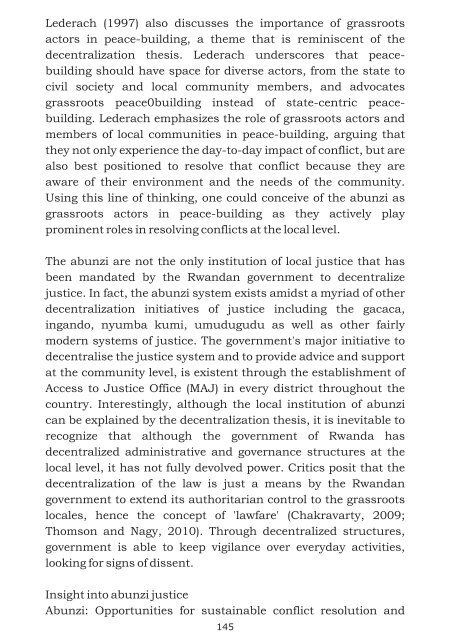Beneficiaries are actors too.pdf - Southern Institute of Peace ...
Beneficiaries are actors too.pdf - Southern Institute of Peace ...
Beneficiaries are actors too.pdf - Southern Institute of Peace ...
Create successful ePaper yourself
Turn your PDF publications into a flip-book with our unique Google optimized e-Paper software.
Lederach (1997) also discusses the importance <strong>of</strong> grassroots<br />
<strong>actors</strong> in peace-building, a theme that is reminiscent <strong>of</strong> the<br />
decentralization thesis. Lederach underscores that peacebuilding<br />
should have space for diverse <strong>actors</strong>, from the state to<br />
civil society and local community members, and advocates<br />
grassroots peace0building instead <strong>of</strong> state-centric peacebuilding.<br />
Lederach emphasizes the role <strong>of</strong> grassroots <strong>actors</strong> and<br />
members <strong>of</strong> local communities in peace-building, arguing that<br />
they not only experience the day-to-day impact <strong>of</strong> conflict, but <strong>are</strong><br />
also best positioned to resolve that conflict because they <strong>are</strong><br />
aw<strong>are</strong> <strong>of</strong> their environment and the needs <strong>of</strong> the community.<br />
Using this line <strong>of</strong> thinking, one could conceive <strong>of</strong> the abunzi as<br />
grassroots <strong>actors</strong> in peace-building as they actively play<br />
prominent roles in resolving conflicts at the local level.<br />
The abunzi <strong>are</strong> not the only institution <strong>of</strong> local justice that has<br />
been mandated by the Rwandan government to decentralize<br />
justice. In fact, the abunzi system exists amidst a myriad <strong>of</strong> other<br />
decentralization initiatives <strong>of</strong> justice including the gacaca,<br />
ingando, nyumba kumi, umudugudu as well as other fairly<br />
modern systems <strong>of</strong> justice. The government's major initiative to<br />
decentralise the justice system and to provide advice and support<br />
at the community level, is existent through the establishment <strong>of</strong><br />
Access to Justice Office (MAJ) in every district throughout the<br />
country. Interestingly, although the local institution <strong>of</strong> abunzi<br />
can be explained by the decentralization thesis, it is inevitable to<br />
recognize that although the government <strong>of</strong> Rwanda has<br />
decentralized administrative and governance structures at the<br />
local level, it has not fully devolved power. Critics posit that the<br />
decentralization <strong>of</strong> the law is just a means by the Rwandan<br />
government to extend its authoritarian control to the grassroots<br />
locales, hence the concept <strong>of</strong> 'lawf<strong>are</strong>' (Chakravarty, 2009;<br />
Thomson and Nagy, 2010). Through decentralized structures,<br />
government is able to keep vigilance over everyday activities,<br />
looking for signs <strong>of</strong> dissent.<br />
Insight into abunzi justice<br />
Abunzi: Opportunities for sustainable conflict resolution and<br />
145


